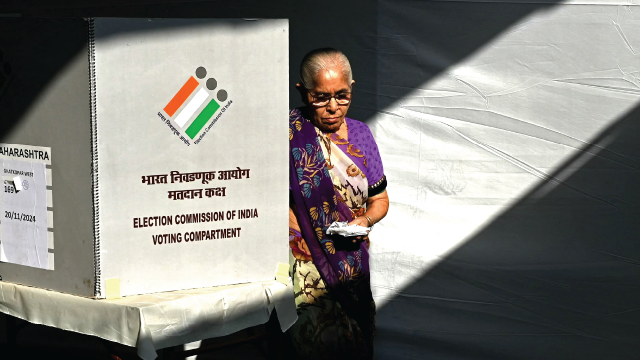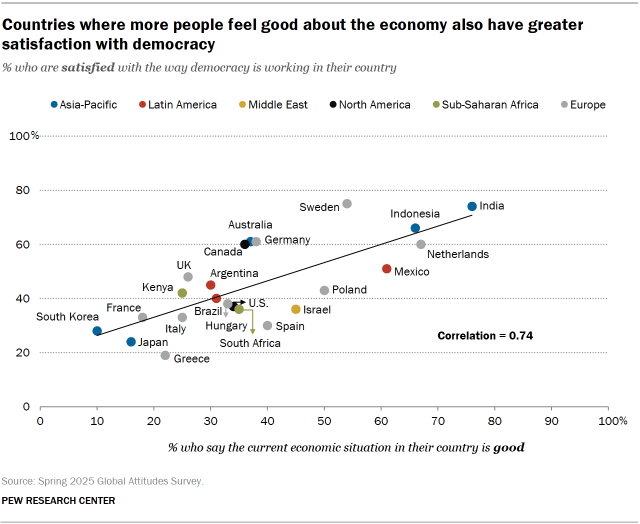
Public dissatisfaction with democracy continues to outweigh satisfaction across 12 high-income countries that Pew Research Center has surveyed consistently since 2017.
Across that set of countries – Canada, France, Germany, Greece, Italy, Japan, the Netherlands, South Korea, Spain, Sweden, the United Kingdom and the United States – a median of 64% of adults say they are dissatisfied with the way their democracy is working, while a median of 35% are satisfied.

In the eight years we’ve been asking this question, people’s overall satisfaction with the functioning of democracy has dropped. In 2017, a median of 49% of adults across these countries were satisfied with how their democracy was working, while an identical 49% were not. Satisfaction returned to this level during the COVID-19 pandemic but has declined further in the years since.
What is a median?
In this analysis, median scores are used to help readers see overall patterns in the data. The median percentage is the middle number in a list of all percentages sorted from highest to lowest.
This doesn’t necessarily mean people are turning away from democratic values. Our research has shown that people around the globe think representative democracy is a good system of government. At the same time, many are frustrated with political elites or feel their views are not truly represented in government.
Related: What Can Improve Democracy?
Satisfaction with democracy varies by country

In addition to the 12 countries where the Center has consistently tracked satisfaction with democracy over time, we asked the same question in 11 other nations this year.
Across all 23 countries surveyed, a median of 58% of adults are dissatisfied with how their democracy is working, while 42% are satisfied.
Satisfaction with democracy varies widely in Europe, from 75% in Sweden to just 19% in Greece. There is a similarly broad range of views in the five Asia-Pacific nations polled (Australia, India, Indonesia, Japan and South Korea).
In Israel, as well as the African and Latin American nations surveyed, assessments of how democracy is working tend to be more negative than positive. For example, 63% of adults in South Africa are dissatisfied with their democracy, while 36% are satisfied.
Ties to views of current economic conditions
Many things can influence how satisfied people feel with the way their democracy is working, but economic perceptions are one important factor. Countries where large shares of the public say the economy is in good shape also tend to have large shares who are satisfied with their democracy.
India, Indonesia, Mexico, the Netherlands and Sweden are examples of countries where people are relatively happy with both their democracy and their economy. In contrast, adults in France, Greece, Italy, Japan and South Korea tend to be down on the state of both democracy and the economy.

Changes since last year
Since 2024, satisfaction with democracy has decreased in five countries (Israel, Japan, Kenya, Poland and South Korea) and increased in five others (Canada, Germany, South Africa, the UK and the U.S.).
Countries in this analysis
The countries included in this analysis consistently receive moderately to strongly positive ratings from research organizations that rate the health of democracy, such as the Economist Intelligence Unit, Freedom House and the Varieties of Democracy Project.
Four of the countries where satisfaction grew held national elections between our 2024 and 2025 surveys. In each one, views changed among partisan groups in ways that reflect election results: In general, supporters of a party that won an election, or sometimes a party that exceeded expectations in an election, became happier with the state of democracy.
- Germany: In February 2025, the Christian Democratic Union (CDU) and its partner party the Christian Social Union (CSU) won the nation’s parliamentary elections. Satisfaction with democracy increased in 2025 among CDU and CSU supporters. It stayed about the same among those who support two other German political parties: the Social Democratic Party and the Greens.
- South Africa: The African National Congress (ANC) got the most votes in South Africa’s May 2024 elections but failed to win a majority of National Assembly seats for the first time since the end of apartheid. Satisfaction is essentially unchanged among ANC supporters but has risen among supporters of the Democratic Alliance, which joined ANC in a coalition government.
- United Kingdom: The Labour Party achieved a majority in Parliament, ending 14 years of Conservative Party rule. Satisfaction with democracy rose significantly among Labour supporters, while it is basically unchanged among Conservatives.
- United States: Republicans maintained their majority in the House of Representatives while also gaining a Senate majority and winning the presidency. Since our 2024 survey, Republicans’ satisfaction with democracy has increased significantly, while Democrats’ satisfaction dropped significantly.
Related: Global Elections in 2024: What We Learned in a Year of Political Disruption
The other country where satisfaction with democracy has increased over the past year – Canada – held elections shortly after we completed our 2025 survey fieldwork there. Six-in-ten Canadians were satisfied with their democracy in that survey, and in the weeks after it was conducted, voters gave the Liberal Party its fourth consecutive victory.
National elections have also taken place in Australia, Poland and South Korea since we completed fieldwork. Much like Canadians, roughly six-in-ten Australians were satisfied with democracy in our latest survey, and voters subsequently returned the incumbent Labor Party to power.
Poland and South Korea are among the countries where satisfaction with democracy decreased between 2024 and 2025. In Poland, Karol Nawrocki, who had support from the Law and Justice party, won the presidency in a June runoff, in what was widely seen as a rebuke of Prime Minister Donald Tusk’s governing coalition.
Also in June, South Koreans elected Democratic Party nominee Lee Jae-myung to the presidency, defeating the People Power Party of predecessor Yoon Suk Yeol. Yoon was impeached and later removed from office following his short-lived declaration of martial law in December 2024.
Note: Here are the questions used for this analysis, along with responses, and the survey methodology.

